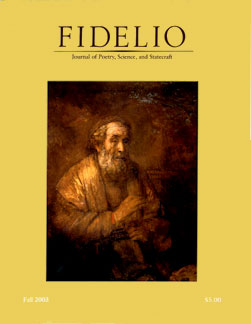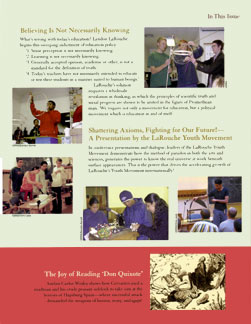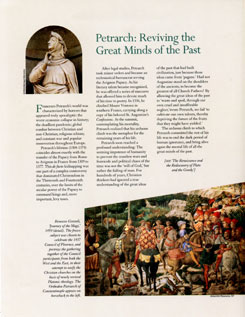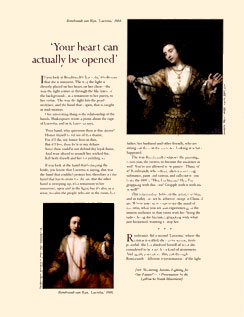
Home | Search | About | Fidelio | Economy | Strategy | Justice | Conferences | Join
Highlights | Calendar | Music | Books | Concerts | Links | Education | Health
What's New | LaRouche | Spanish Pages | Poetry | Maps
Dialogue of Cultures
FIDELIO
Journal of Poetry, Science, and Statecraft
Fall, 2003 Vol XII, No.3
PDF Archive
full issue, plus PDFs of each article


FRONT COVER
BACK COVER


Front Inside Cover
Petrarch: Reviving the
Great Minds of the Past
Back Inside Cover
‘Your heart can
actually be opened’
FIDELIO
Table of Contents
“It is through beauty that one proceeds to freedom.”
—Friedrich Schiller
Fall 2003
|
Believing Is Not
Necessarily Knowing Lyndon H. LaRouche, Jr. 4 The Renaissance, and the Rediscovery of Plato and the Greeks Torbjörn Jerlerup 36 The Joy of Reading— Don Quixote Carlos Wesley 56 Shattering Axioms, Fighting For Our Future! A PRESENTATION BY THE LAROUCHE YOUTH MOVEMENT 74 |
|||||||||
| Editorial News Obituary Commentary Books |
2 105 105 107 108 67 |
The Roosevelt Syndrome LaRouche in Turkey: ‘Remove Cheney from Power’ Maestro Briano Visits Los Angeles Graham Lowry’s Historic Mission Amelia Robinson Addresses Leipzig Peace Rally The Immense Debt of Ibero_America to the German-Jewish Renaissance The Shaman’ Coat |
|||||||
Fall 2003 Fidelio Released
The 112-page fall issue of Fidelio was released this week in time for the Labor Day National Conference of the Schiller Institute. The blockbuster issue contains several features which, combined, will be powerful organizing tools in the hands of the LaRouche Youth Movement as campuses reopen across the country this fall.
Those features, all of which challenge the false axiomatic assumptions that have led the world to the current crisis, include:
- “Believing is Not Necessarily Knowing" by Lyndon H. LaRouche, Jr. As LaRouche writes in the introduction to this essay: "A see-saw battle between the opposing forces of Classical science and philosophical reductionism, has reigned throughout globally extended ancient, medieval, and modern European civilization, up through the present day. Now, once again, a new youth movement has appeared an indispensable ingredient for the effort to rescue civilization; but, this time, let us build it more wisely, on the basis of lessons which should have been learned from the outcomes of the campaigns of the past. We must rapidly develop many veritable 'platoons' of truly qualified, young intellectual leaders steeped in a distillation of the most crucial products of the Classical tradition to date. For this, we require not only a movement for education, but a political movement which is education in and of itself.”
- “Shattering Axioms, Fighting for Our Future"—the complete, illustrated transcript of the Youth Panel from the Presidents' Day 2003 conference of the Schiller Institute, which embodies the kind of "political movement for education" described by LaRouche in his essay.
- “The Renaissance and the Rediscovery of Plato and the Greeks," by Torbjorn Jerlerup of Sweden, reports on the project begun by Petrarch to get the works of Classical Greece, especially Plato, translated and circulated in Europe, leading to the Council of Florence.
- “The Joy of Reading ‘Don Quixote,’ by Carlos Wesley: “How Cervantes used a madman, his crude peasant sidekick, and the method of paradox, to take aim at the evils of Hapsburg Spain.”
Also in the issue are the following:
- A news report on the historic visit of U.S. Democratic Presidential pre-candidate Lyndon LaRouche and his wife, Helga Zepp LaRouche, to Turkey.
- A first-hand report by two members of the LaRouche Youth Movement on the visit of Maestro José Briano of Mexico to Los Angeles, where he conducted four days of bel canto voice training sessions.
- An obituary written in memory of long-time LaRouche associate Graham Lowry. Graham was the author of a seminal work on the history of America leading up to the American Revolution: “How the Nation Was Won: America's Untold Story, Volume I, 1630-1754.”
- A commentary drafted in 1999 by Carlos Cota Meza, the intellectual leader of the International Caucus of Labor Committees and the Schiller Institute in Mexico, who died on March 21, 2002. The commentary is entitled: "The Great Debt of Ibero-America to the German-Jewish Renaissance: A Communication from Mexico.”
Both Carlos Cota Meza and Graham Lowry distinguished themselves for all eternity as soldiers for the truth, who had the courage to stand up against the fascist, synarchist ideology of Hispanidad at great personal sacrifice, even as others remained silent or worse.
Through the lives they lived, they both embodied the principle, as LaRouche spells it out in this issue, that "Believing Is Not Necessarily Knowing." May they both be an inspiration to the LaRouche Youth Movement, for, as Friedrich Schiller wrote: “What greater gift than truth has any man to give to man?”
![]()
Fidelio Magazine:
schiller@schillerinstitute.org
ORDER FIDELIO Magazine Today
Join the Schiller Institute and receive 4 issues of Fidelio Magazine
FIDELIO Table of Contents PAGE
(text listing of all issues)
schiller@schillerinstitute.org
The Schiller Institute
PO BOX 20244
Washington, DC 20041-0244
703-297-8368
Thank you for supporting the Schiller Institute. Your membership and contributions enable us to publish FIDELIO Magazine, and to sponsor concerts, conferences, and other activities which represent critical interventions into the policy making and cultural life of the nation and the world.
Contributions and memberships are not tax-deductible.
VISIT THESE OTHER PAGES:
Home | Search | About | Fidelio | Economy | Strategy | Justice | Conferences | Join
Highlights | Calendar | Music | Books | Concerts | Links | Education | Health
What's New | LaRouche | Spanish Pages | Poetry | Maps
Dialogue of Cultures
© Copyright Schiller Institute, Inc. 2002. All Rights Reserved.